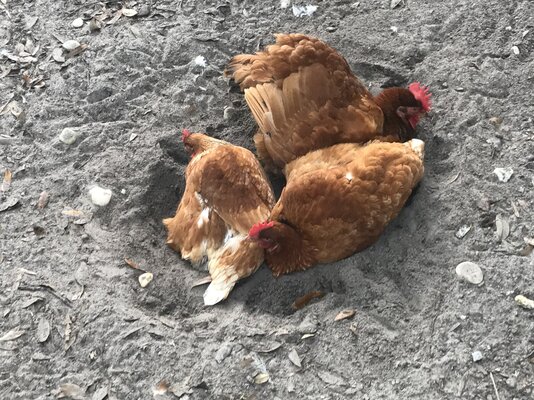Michael A
Chirping
All 6 hens from my first year died 4 from egg yolk peritonitis.
Chicken ownership was tough on my chickens physically and me emotionally the first year as I lost chicken after chicken. I had my perches too high and one fell off, a predator got into the fenced in area and got one but the disease was the worst. I read thread after thread trying to determine what was causing my chickens to get sick. I still don't know for sure which change made the difference or a if it was a combination but for the past year or so I have not had one hen get sick and all 8 have fluffy bums.
Changes
1. Water, the water in my area has Ph above 7, I bought a meter and use citric acid to reduce it to 4.5 to 5.5., now there is less slime too.
2. I added a bit of grit and calcium directly to their feed additional to leaving it out to nibble on.
3. I added Poultry Probiotic to their food and Hen Helper to their water.
4. I keep a close eye on their poop and bums. At the first sign coccidiosis in any one of them I treat the flock with Amprolium, about every 6 months.
5. Twice a year for two weeks i add Harris food grade diatomaceous earth to their feed to kill any other parasites
I also limit table scraps to green vegetables. Before I was giving rice, pasta, tomatoes and strawberries. I am not saying you shouldn't but I stopped and perhaps I was giving too much but I was not sure what was causing my hens to get sick, so i stopped. It's ok though, there are other treats i give them that are 100% safe. Greens, scratch and dried meal worms. They still love them.
I am not a chicken expert by any means but I am really happy with chicken ownership now that I have healthy hens.
These are some of my girls enjoying a bath.
Chicken ownership was tough on my chickens physically and me emotionally the first year as I lost chicken after chicken. I had my perches too high and one fell off, a predator got into the fenced in area and got one but the disease was the worst. I read thread after thread trying to determine what was causing my chickens to get sick. I still don't know for sure which change made the difference or a if it was a combination but for the past year or so I have not had one hen get sick and all 8 have fluffy bums.
Changes
1. Water, the water in my area has Ph above 7, I bought a meter and use citric acid to reduce it to 4.5 to 5.5., now there is less slime too.
2. I added a bit of grit and calcium directly to their feed additional to leaving it out to nibble on.
3. I added Poultry Probiotic to their food and Hen Helper to their water.
4. I keep a close eye on their poop and bums. At the first sign coccidiosis in any one of them I treat the flock with Amprolium, about every 6 months.
5. Twice a year for two weeks i add Harris food grade diatomaceous earth to their feed to kill any other parasites
I also limit table scraps to green vegetables. Before I was giving rice, pasta, tomatoes and strawberries. I am not saying you shouldn't but I stopped and perhaps I was giving too much but I was not sure what was causing my hens to get sick, so i stopped. It's ok though, there are other treats i give them that are 100% safe. Greens, scratch and dried meal worms. They still love them.
I am not a chicken expert by any means but I am really happy with chicken ownership now that I have healthy hens.
These are some of my girls enjoying a bath.
Attachments
Last edited:




